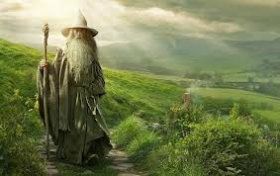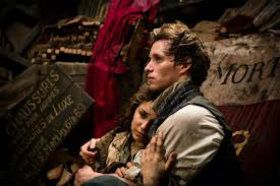 So I never thought I’d ever compare The Hobbit to Les Miserables, but here we go.
So I never thought I’d ever compare The Hobbit to Les Miserables, but here we go.
I saw both movies and I have surprisingly close to the same things to say about both. The Hobbit and Les Miserables are both well-produced, well-performed, big-budget epics that deliver exactly what you’d expect and make you feel you’ve gotten every penny’s worth—and yet still miss hitting the bullseye.
I was never a Lord of the Rings fan, so if you’re a Tolkien-ite, you’ll want to stop reading now. The Hobbit: An Unexpected Journey is cut from the exact same cloth as the original Lord of the Rings trilogy, so if you liked those, you’ll like this. It is a giant comic book on screen, one big action sequence after another, fantastical characters and peril meeting our heroes every step of the way. The story? Does it matter? This is an adventure, an escape, two hours out of your life to go somewhere beautiful and dream-like, get absorbed in the outlandish thrills and be awed by the amazing set pieces, costumes and CGI wonders. But no matter how wonderful this movie is to look at (and if you’re wondering what looks SO different about it, it’s director Peter Jackson’s use of 48 frames-per-second, which, in layman’s speak, means it is so sharp, you’ll feel like you’re watching a video game, not a movie), there is nothing new here. You’ve seen it all before. Three times, in fact.
 Les Miserables also delivers exactly what you are expecting, the only surprise being how terribly miscast Russell Crowe is. Never once have I thought that Crowe was the worst thing in ANY movie—until now. And yet the movie survives, thanks to other performers who are so good, they make you (almost) forget Crowe’s inability to hit any high notes. Hugh Jackman carries the movie on his substantial shoulders and he is great casting for the heroic and tortured Jean Valjean, one of the most iconic characters in literature. Based on Victor Hugo’s novel and the massively popular stage musical, Les Miserables really couldn’t break any new ground here without inciting a riot amongst its avid fans, so, instead, director Tom Hooper (The King’s Speech) delivers a straightforward rendition, epic and tragic, soaring and heartbreaking. For every movie this year that didn’t have story, Les Miserables makes up the difference, with a story so magnificent you might be more moved by its beauty than the pictures on the screen.
Les Miserables also delivers exactly what you are expecting, the only surprise being how terribly miscast Russell Crowe is. Never once have I thought that Crowe was the worst thing in ANY movie—until now. And yet the movie survives, thanks to other performers who are so good, they make you (almost) forget Crowe’s inability to hit any high notes. Hugh Jackman carries the movie on his substantial shoulders and he is great casting for the heroic and tortured Jean Valjean, one of the most iconic characters in literature. Based on Victor Hugo’s novel and the massively popular stage musical, Les Miserables really couldn’t break any new ground here without inciting a riot amongst its avid fans, so, instead, director Tom Hooper (The King’s Speech) delivers a straightforward rendition, epic and tragic, soaring and heartbreaking. For every movie this year that didn’t have story, Les Miserables makes up the difference, with a story so magnificent you might be more moved by its beauty than the pictures on the screen.
The unique elements of this film version of Les Miz (this is the fifth screen incarnation, the most recent being a non-musical version back in 1998 with Liam Neeson and Geoffrey Rush) make it the experience that it is. Almost all the dialogue is sung, so if you are a theatre neophyte, this will be a difficult slog. But if you are a theatre purist, this will please you to no end. But the most impressive element of Tom Hooper’s Les Miserables was the director’s decision to have all the singing (almost the entire movie) done live on set. That means no dubbing in later of the songs that were sung to perfection in the studio. What you are seeing—and hearing—was sung and captured right there in the scene. So, when Hugh Jackman is hitting all the right notes while slogging through raging seas and crawling through a sewer? There’s a reason he has a Tony. This is the type of movie that separates the Hollywood poseurs from the truly gifted professionals and this film is proof that talent exists and wow, is it impressive to see up close. We are a long way from Natalie Wood’s singing being dubbed in by another singer altogether in West Side Story.
While Hugh Jackman’s is the primary performance in the film, his is not even the best. That honor goes to three young performers: Anne Hathaway, Eddie Redmayne and Samantha Barks. These three actors are the reason to see this film. Their performances are staggering. Hathaway will surely win the Oscar for Best Supporting Actress with her heartbreaking delivery—in one take—of the show’s most famous song, “I Dreamed A Dream.” I was in a full house and I couldn’t hear anyone even breathing during her number, it is so riveting and deeply moving. And Redmayne and Barks are absolute revelations, I never wanted them to leave the screen.
But the movie itself is just like the stage version: overwrought and overdone. There are numbers we could’ve done without and it is probably the most depressing movie ever to open at Christmas, and that includes The Girl With the Dragon Tattoo. But still, the theatre lovers will be happy, because this is a magnificent and faithful adaptation and the music never stops. Even though an intermission, just to go outside and look at the sun for a moment, would’ve been nice.
